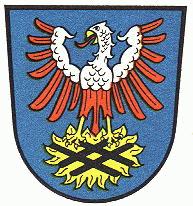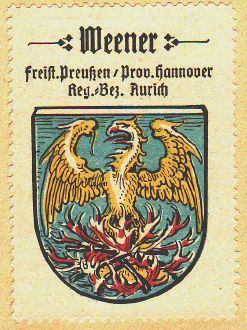Weener: Difference between revisions
Knorrepoes (talk | contribs) m (Text replacement - " / Arms" to "/Arms") |
Knorrepoes (talk | contribs) m (Text replacement - "{{media}} Literature : Stadler, 1964-1971, 8 volumes." to "Literature : Stadler, 1964-1971, 8 volumes. {{media}}") |
||
| Line 29: | Line 29: | ||
|} | |} | ||
[[Civic Heraldry Literature - Germany|Literature]] : Stadler, 1964-1971, 8 volumes. | |||
{{media}} ; Kaffee Hag picture albums, 1920s. | |||
[[Category:German Municipalities W]] | [[Category:German Municipalities W]] | ||
Revision as of 08:04, 8 September 2022
This page is part of the German heraldry portal Deutsche Wappensammlung |
Heraldry of the World |
|
German heraldry:
|
Selected collector's items from Germany:
|
WEENER
State : Niedersachsen
District (Kreis) : Leer (until 1934 Weener)
Additions : 1973 Beschotenweg, Diele, Holthusen, Kirchborgum, St. Georgiwold, Stapelmoor, Vellage, Weenermoor
| German | |
| English | No blazon/translation known. Please click here to send your (heraldic !) blazon or translation |
Origin/meaning
The arms show the legendary Phoenix rising from the fire. The first known seal of the town dates from the early 19th century and shows in a quartered shield the Phoenix in the second and third quarter. The first and fourth quarter showed the lion of the Kingdom Holland, to which the village belonged at the time (the French vassal state). In the middle of the 19th century the lion was removed, but the colours were not officially determined until 1932 after the granting of the city rank in 1929.
The origin or meaning of the phoenix is not known, although it has been postulated that it symbolises the destruction and rebuilding of the town during the 30-years war.
In the Kaffee Hag albums of the early 20th century the arms were shown in slightly different composition:
| The arms by Hupp in the Kaffee Hag albums +/- 1925 |
Literature : Stadler, 1964-1971, 8 volumes.
Contact and Support
Partners:
Your logo here ?
Contact us
© since 1995, Heraldry of the World, Ralf Hartemink 
Index of the site ; Kaffee Hag picture albums, 1920s.













